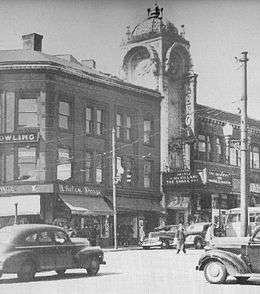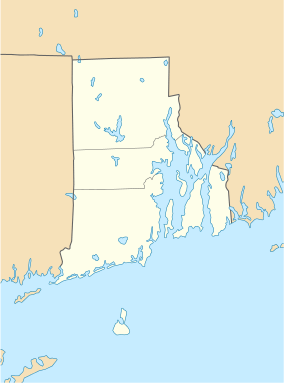Leroy Theatre
|
Leroy Theatre | |
 | |
  | |
| Location | Pawtucket, Rhode Island |
|---|---|
| Coordinates | 41°52′48″N 71°23′15″W / 41.88000°N 71.38750°WCoordinates: 41°52′48″N 71°23′15″W / 41.88000°N 71.38750°W |
| Built | 1922 |
| Architect | John F. O'Malley |
| Architectural style | Classical Revival, Other |
| Demolished | 1997[1] |
| NRHP Reference # | 83000181[2] |
| Added to NRHP | August 4, 1983 |
Leroy Theatre was a historic movie palace at 66 Broad Street in Pawtucket, Rhode Island. It was built in 1922, listed on the National Register in 1983, and demolished in 1997.
The building
The Leroy was one of the finest and largest theatres of the period in all of New England, built when Pawtucket was at its economic height. It was one of the finest buildings in a city already brimming with distinguished architecture.[1] The lobby featured a large fireplace, a grand staircase, and a frieze of golden vases. The interior had seats for 2,700 people, and included extensive ornamentation such as mirrors, colored lights, brass rails, and gold leaf.[1] It had a mirrored lobby, an electric chandelier with 4,700 bulbs, and the largest Wurlitzer organ in New England.[3] Above the balcony was a dome filled with classical sculpted figures.[1]
History
The theatre was designed by architect John F. O'Malley and was built in 1922 for client Charles Payne, a power company executive.[1] Payne spared no expense on the building, named in honor of Payne's son Leroy, who had been killed in World War I.[1]
The theatre opened in May 1923.[3] Charles Payne died four years later, on January 5, 1927.[4] He was 59 years old.[4]
At the time of the Leroy's construction, Pawtucket was a prosperous mill town. In addition to the Leroy, Pawtucket boasted a half-dozen theatres and two dozen hotels.[1] However, the Leroy was considered the "most lavish public building" in Pawtucket, and referred to as Pawtucket's Million Dollar Theatre.[1]
The Leroy hosted vaudeville acts, silent (and then sound) movies, and all manner of theatrical productions and musical performances. However, by the late 1960s, the once-wealthy mill town of Pawtucket had fallen into decline, and suburban moviegoers generally began to prefer multiplexes to the old downtown movie palaces.
The theatre was closed in 1963, briefly reopened in 1976, and was again shuttered.[5] It was listed on the National Register of Historic Places in 1983.[2]
A ballet company briefly attempted to use the theatre in 1984.[3] The theatre was operated as a concert hall from 1986 to 1990.[3] In April 1997 the building was sold to a Boston developer and demolished later that year, along with three neighboring buildings, to build a Walgreens drugstore.[1]
See also
External links
- The Leroy Theatre at Cinema Treasures
References
- 1 2 3 4 5 6 7 8 9 "The Leroy Theatre, RIP". Providence, RI: The Providence Journal-Bulletin. 14 September 1997. p. D6.
- 1 2 National Park Service (2007-01-23). "National Register Information System". National Register of Historic Places. National Park Service.
- 1 2 3 4 "Leroy Theater". Cinema Treasures. Cinema Treasures, LLC. Retrieved 6 July 2016.
- 1 2 "Obituary: Charles Payne". The New York Times. 6 January 1927. p. 27. Retrieved 6 July 2016.
Charles Payne, general manager and treasure of the Leroy Theatre Company of Pawtucket, RI, died in Pawtucket yesterday. He was 59 years old. He built the Leroy, a million dollar playhouse which was opened last April.
- ↑ "NRHP nomination for Leroy Theatre" (PDF). National Park Service. Retrieved 2014-11-15.